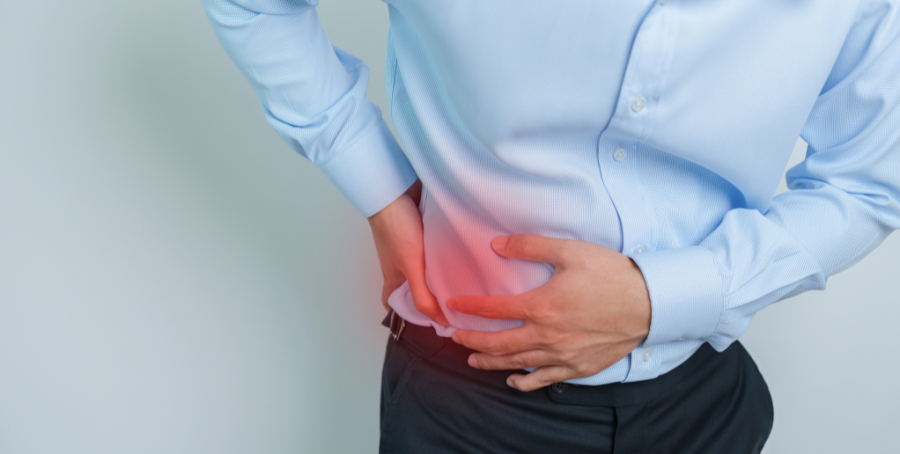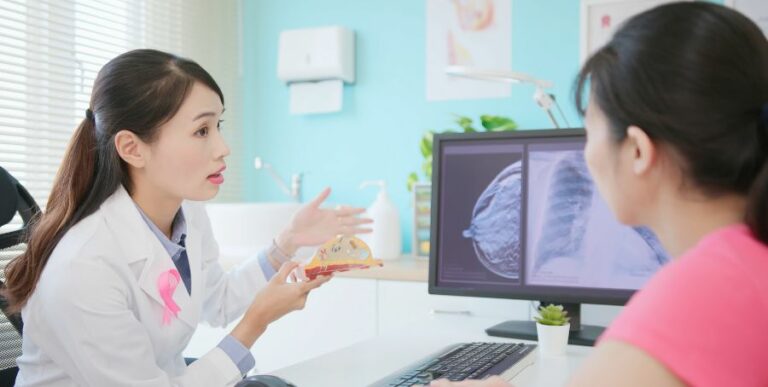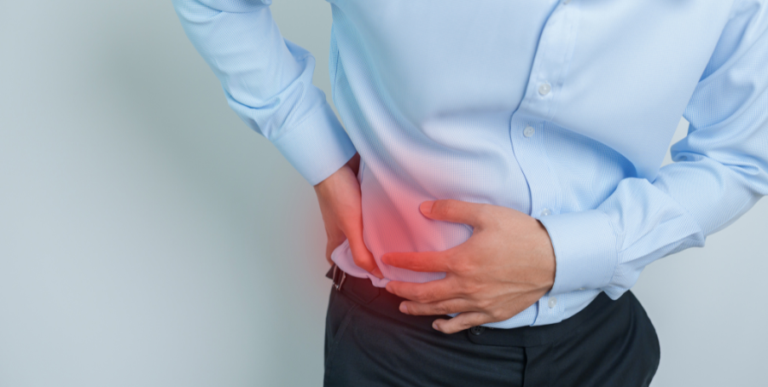If you feel a dull ache or random sharp pain in the upper right side of your abdomen just under your ribs, it could be liver pain. Sometimes this pain spreads to your back, right shoulder, or neck.
While it may be subtle or just a sign of temporary condition like indigestion, never ignore these signals. It could indicate something more serious like liver disease or cancer. But what exactly is it?
Liver screening is the best way to find out. It is key to catching cancer early on, which can lead to faster treatment, better outcomes, and more effective pain management. In this article, we will explain what liver pain means, when to seek help, and how liver screening can protect your health.
Table of Contents
ToggleWhat Does Liver Pain Feel Like?
Liver pain is described as pain in the upper right abdomen, where your liver is located. Interestingly, your liver itself cannot feel pain: it lacks pain receptors—proteins that alert your brain to pain from an injury. So where does the pain come from?
The answer lies in the surrounding tissues, which do have pain receptors and can become irritated or inflamed due to liver problems. Liver issues can cause pain to travel to the right shoulder blade, back, and neck. Also known as referred pain, this occurs due to blockage in the nerves or blood vessels travelling along the body. Particularly, the phrenic nerve is the main nerve connecting the liver to the neck, with nerve branches that reaches the shoulder. Swelling, cysts, abscess (pus), or worse, a tumour growth are possible causes of this blockage.
Location aside, the type of pain can differ based on the condition:
- Dull, throbbing pain: Soft tissue damage or scarring.
- Sharp, stabbing pain: Inflammation of the peritoneum (membrane lining the liver) or pressure on the nerves.
Common Causes of Liver Pain
The liver is a complex organ, which also means it’s more vulnerable to different diseases that can cause liver pain:
Hepatitis
Liver inflammation due to a viral or bacterial infection from contaminated food, body fluids transmission (sexual contact, needles, mother to child during birth), and chemical toxins such as alcohol or drugs. Besides upper abdominal pain, you may also experience diarrhoea and fatigue.
If left untreated, your liver will be weakened and cannot fight off other infections, increasing the risk of developing a liver abscess (pus) or cyst (fluid). A sudden, intense liver pain could indicate that the liver cysts have ruptured.
Thrombosis
Blood clots in the hepatic portal vein prevent the liver from receiving the nutrients it needs to function properly. The buildup of blood can cause sudden, sporadic pain in the upper right abdomen. Clots are commonly developed from a liver injury such as a fall.
Fatty liver disease
When your liver has too many fats built up, it swells and presses against the surrounding tissues and nerves, leading to a dull pain and discomfort in the upper right abdomen. Other symptoms include unexplained weight loss and constant fatigue.
Fatty liver disease is either from alcohol overuse (alcohol-induced fatty liver disease) or non-alcoholic factors (non-alcohol fatty liver disease) such as type 2 diabetes, obesity, and chronic inflammation.
Cirrhosis
Cirrhosis is the scarring of the liver tissues, a symptom in the later stages of many liver diseases ranging from infection, fatty liver disease, and alcohol abuse. Liver cirrhosis increases the risk of liver failure or cancer. People with cirrhosis usually complain of a dull, throbbing pain that spreads to the back, shoulders, and joints.
Non-liver related issues
Just because you feel pain around your liver doesn’t always mean the liver is the problem. Since it’s close to other organs like the gallbladder and stomach, issues with those can sometimes feel like liver pain. Gallstones—hardened deposits block the bile duct—similarly cause pain, nausea, and bloating in the upper abdomen.
Another possible cause is cholangitis, an infection of the bile ducts which transports bile (fluid that breaks down fats) from the liver the gallbladder and small intestines.
When Liver Pain Could Be a Sign of Cancer
Unlike other diseases, liver pain from cancer is often chronic and persistent. Pain manifests in varying forms:
- Dull, throbbing pain (Visceral): Occurs when the tumour presses against the liver
- Sharp, stabbing pain (Parietal): Lining of the abdominal cavity (peritoneum) becomes stretched, damaged, or inflamed from the growing tumour.
- Referred pain: Tumours may press against the phrenic nerve, causing sharp pain to “travel” along the body to the right shoulder blade or back.
Pain may intensify in advanced stages of liver cancer. Recurrent acute pain, ironically, makes our pain receptors more sensitive to pain signals. In some cases, liver cancer patients experience bone pain (cancer-induced bone pain): cancer cells and chronic inflammation can over-activate a type of bone cell called osteoclasts, which breaks down bone tissue. This creates an acidic environment that activates sensory neurons, increasing pain sensitivity.
However, liver pain is not specific to liver cancer. Patients often have accompanying symptoms including:
- Swollen abdomen
- Jaundice (yellowing of the skin and whites of the eyes)
- Unexplained weight loss
- Nausea and vomiting
- Fever
Several factors can increase the risk of developing liver cancer:
- Hepatitis B/C infection
- Family history of liver cancer or issues like cirrhosis or fatty liver disease
- Prolonged alcohol use
- Type 2 Diabetes
Importance of Liver Cancer Screening
Liver cancer is a silent villain: it develops quietly, without visible symptoms until it reaches advanced stages. Thankfully, even the stealthiest cancers can be detected with current screening techniques such as ultrasounds, CT scans, and MRI. They produce images of the liver, helping doctors detect hidden tumours or abnormalities even if you do not experience symptoms.
Regular screening is important: early detection can significantly improve treatment outcomes and protect your health. From surgery and targeted therapies to less invasive treatments, early diagnosis opens the door to a quicker recovery. Early detection is especially vital if you have a family history of liver cancer, have chronic liver diseases like hepatitis B/C, or are experiencing symptoms like:
- Persistent liver pain
- Nausea and vomiting
- Swollen abdomen
- Pressure under the ribs
- Jaundice (yellowing of the skin or the whites of the eyes)
Catch liver cancer before it has a chance to fight back. Don’t wait! book your liver screening today!
Conclusion
Liver pain comes in many forms: dull, stabbing, throbbing, persistent or acute. Yet they all send the same message: something is wrong with your liver. Do not ignore these signals!
A liver screening can help identify the cause, whether it’s inflammation, scarring, an infection, or something more serious like cancer. Instead of worrying or guessing, getting checked gives you clarity and peace of mind. It is quick, simple, and potentially life-saving. With our experienced team here address every concern, rest assured that you will have a comfortable screening experience.
If you experience liver pain, call us to book a liver screening today!
FAQs About Liver Pain and Screening
Can I take pain medications for liver pain?
While pain medications like acetaminophen can be consumed, overusing them can add more stress to the liver. Exercise caution and consult your doctor about which pain medications are safe for you.
Does having liver pain means I have liver cancer?
Not necessarily. Liver pain can stem from other conditions such as an infection or fatty liver disease. A liver screening and blood tests are required to pin down the exact cause of liver pain.
Is liver screening painful?
Liver screening is generally quick and painless. However, if you feel anxious or uncomfortable, don’t hesitate to share your concerns with your doctor beforehand.
What do I need to do for liver screening?
For a CT scan, you will need to fast for several hours before the screening. For an MRI scan, you can eat or drink as usual, though it is best to avoid alcohol the day before.
Avoid wearing any jewellery or other metallic objects to the appointment. Inform the doctor if you have metal implants, tattoos or piercings. As you’ll need to change into a hospital gown, it will be convenient to dress in comfortable clothing.




